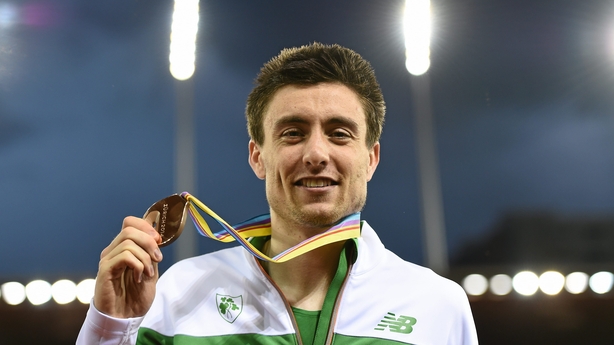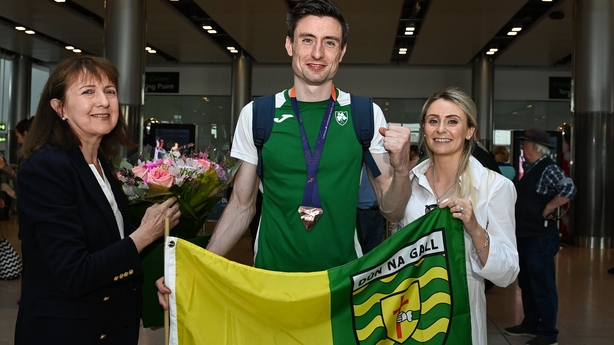When Mark English won his first European outdoor bronze in Zurich eight years ago, he was quoted afterwards as describing the race as a "blur".
Now, at 29, he claimed his second in a cooler, rather more methodical fashion.
Whereas he was an insurgent figure in 2014, surprising both himself and the field to reach the podium, this time around he was widely fancied to be among the likely medalists.
If you had offered him a bronze in advance of the race, English would not have snapped your hand off for it. But by the time he arrived at the finish line, he was delighted to take his spot on the podium, knowing he'd run the best race he could in the circumstances.
"Going into the race, if you had asked the question, would I have been happy with the bronze, I might have said 'not really' because I did feel there was a chance I could get the win," English told RTÉ Sport on Wednesday.
"But when I came up to the 800m mark, I was absolutely delighted to get the bronze because I knew there was nothing more I could have done in the race to get the gold. It was just a relief to get the bronze medal at that point."
Highly analytical, English had pegged himself as third favourite going into the final. He carefully plotted how could he position himself for a tilt at a medal - or even a win. For the most part, the race panned almost exactly as he had planned.
We need your consent to load this rte-player contentWe use rte-player to manage extra content that can set cookies on your device and collect data about your activity. Please review their details and accept them to load the content.Manage Preferences
"I felt the two favourites were probably Jake Wightman and Mariano Garcia. And I was probably the third favourite. That's just how I felt. That's where I placed in that field, objectively, if I was looking at it from an outsider's perspective. I didn't want to make the first decision in terms of getting into position.
"And then for the others to make their decisions around the 400m mark and then I'd be left mid-pack, boxed in. I predicted that Garcia would come to the front, like he did in the semi-final and it worked for him there. It was a competitive semi-final that he won.
"I felt that if I was able to slot in behind him and get a free ride on the rail, that would probably be the best opportunity for me. And if I had anything left over the last 100m, then I would give him a shot. But he was just too strong on the day. They were the tactics. I wanted to be in the top three or four at 400m and then the top-two at 600m. I think I was there or thereabouts."
Central to English's thinking ahead of the final was the need to be more measured in the opening quarter of the race. The Donegal athlete had run quicker early splits than any of the other medal contenders in the heats, leaving himself a tad more gassed in the closing stages.
He curbed that tendency in the final, giving himself enough petrol to hold off Sweden's Andreas Kramer on the final straight.
"There was a lot of planning that went into the race and how I was going to run it. I looked at all the splits from the semi-final and the heats.
"There was 100m splits on the European athletics website. In the semi-final, I ran 11.6 from the 100m/200m segments.
"That was much quicker than anyone else had run in that race. Van Diepen ran 11.78 but he's got a 45 second 400m PB so he always has that speed.
"Most other people, like Jake Wightman, ran 12.1 or 12.2 for that segment. So, I knew if I could tone back my speed for the first 200m, I'd be able to leave something in reserve for the last 200m. What you do in the first 200m of an 800m race takes away from your last 200m.
"I was quite tired, even coming around the last 200 metres. I could see Elliot Crestan coming on my outside and I didn't know how much he had left. It was only when I watched the race back and I saw him making a sprint around 500m and I knew he had absolutely emptied his tank at that point.
"I was just trying to push them as wide as I could and make them run the long arc around the bend and I'd have the shortest line possible.
"I knew Wightman would always be strong in that last 100. He could probably have ran in lane 4 and he probably would have still just beaten me on the day. He's just very aerobically strong at the minute.
"I know it's a cliché but it was just about executing the plan I had in my head. Thankfully, it worked out as I expected it to."
How did it feel in comparison to the 2014 bronze?
"It's been so long I can't even remember what my emotional reaction was in 2014. I just remember seeing reports at the time about how I was saying the race was a blur. This time, it was a lot clearer. I had that emotional relief after both races were done. As I do after nearly ever medal I win.
"They were both joyous, I suppose. This time, I was expected to medal, among some people. Whereas, in 2014, I don't think many people expected me to medal because I qualified from the semi-final as a fastest loser from the semi. I guess they were the main differences."

In the intervening years, English won European indoor medals in Prague (2015) and Glasgow (2019) but endured disappointments along the way, failing to escape his heat in Tokyo last year. English insists, however, he hasn't got bogged down in negatives, remaining focused on getting the best out of himself.
And he's confident that he has plenty more to give Irish athletics, noting that several members of the European championships team are on the other side of 30, a threshold English is soon to cross himself.
"To be honest, it's always about trying to get the most out of my body. I think most athletes are trying to do that. I didn't really focus on the negative too much. I knew I had the capability to get back there. There were a few races that gave me my confidence.
"The 500m in Newcastle in 2016 where I just finished behind Rudisha. I knew if I had my training right, I could get back there. While I am 29, there's at least five other athletes on that Irish team who are in their 30s. So, I still have a lot of years left to give in the sport. And I knew it was there this year."
English, a medical doctor, has taken a sabbatical from his employment in Galway University Hospital to allow him to prepare for the championship.
"It's not so much the work," the Donegal athlete says. "But the night shifts are very tiring and they're just not conducive to performing at a high level in athletics.
"But the Galway University Hospital were very accommodating in allowing me to finish up early. Dr Tuite and Dr Gallagher gave me the permission to end my year early and allow me to prepare for these championships and the world championships in Oregon as well. That's been a massive help.
"I'm kind of at a point where it's a little bit premature to know what I'm doing at this point. The original plan was to go back to work in October. But I'll have to wait and see.
"I'm on a medical scheme at the minute. I've one year done out of two years on that. I have until 2025 to get it done. I can join back whenever I want. It's just a matter of ironing out some of the issues at the minute."

Next year comes Budapest and the World Championships - "The world champs are a completely different level" - but for now, English is content to savour the aftermath of his bronze and the adulation back home in Donegal.
"It was brilliant, I arrived home there last night. There was a little gathering outside our home house with all the residents of the local neighbourhood. That was really cool to see everyone there. Finn Valley Athletic Club are doing something for me today as well. It's really nice to see what it means to the community.
"A lot of people have actually commented on how I ran the race. I think that meant a lot to a lot of people as well. It's really nice to see."


